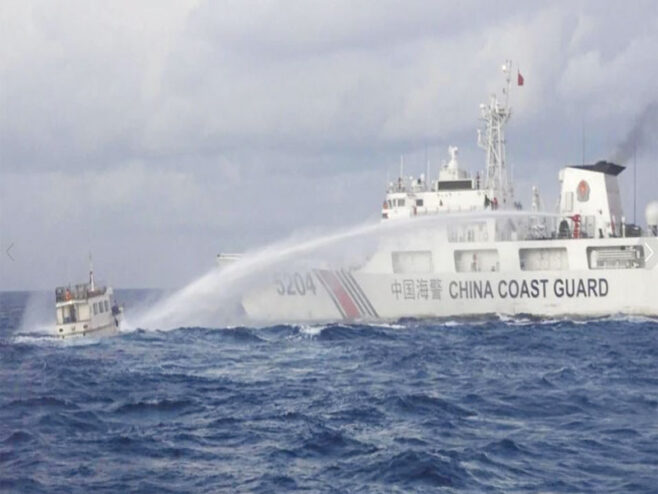Canada has condemned China over “acts of intimidation” against the Philippines in the South China Sea.
Global Affairs Canada on December 12, 2023 released a statement following two recent incidents in the contested waters.
“Canada condemns the actions taken by the People’s Republic of China (PRC) this weekend against Philippine civilian and government vessels in the South China Sea, first at Scarborough Shoal on December 9 and then at Second Thomas Shoal on December 10,” Canada stated.
“The use of dangerous maneuvers, collisions, water cannons and long-range acoustic devices against Philippine vessels endangers lives and poses a serious threat to regional peace and stability.”
Media reports relate that a Philippine boat and a Chinese Coast Guard ship collided near a reef in the South China Sea on December 10.
The Philippines accused China of targeting civilian supply vessels in the Second Thomas Shoal in the disputed Spratly Islands.
The BBC cited a statement from the National Task Force for the West Philippine Sea that a Chinese coast guard vessel rammed one of two supply boats.
In 1999, the Philippines deliberately grounded on the Second Thomas Shoal an aging navy ship, the BRP Sierra Madre, to assert its sovereign rights over the atoll. The shoal lies with the exclusive economic zone of the Philippines.
The December 10 incident comes a day after the Philippines accused China of using water cannons to block three of its vessels.
The three boats were delivering supplies to Filipino fishermen near Scarborough Shoal, located off the island of Luzon.
In its December 12, 2023 statement, Ottawa noted, “These incidents are the latest in an increasingly worrisome pattern of acts of intimidation by the PRC in the South China Sea.”
Also in early December, the Philippines accused China of swarming a reef near its coast after more than 130 military vessels were spotted near Whitsun Reef in the South China Sea.
The Philippines calls Whitsun Reef as the Julian Felipe Reef, which is located west of the island-province of Palawan.
The contested waters have become a flashpoint for China-U.S. relations.
In October this year, U.S. President Joe Biden stated that the U.S. will defend the Philippines in case of any attack.
South China is claimed in whole and parts by China, the Philippines, Taiwan, Malaysia, Vietnam, and Brunei.
In its December 12, 2023 statement, Canada said: “The PRC’s actions demonstrate a clear disregard for navigational rights and freedoms and are inconsistent with its obligations under international law, including the United Nations Convention on the Law of the Sea (UNCLOS).”
As well, “Canada reiterates that the 2016 ruling of the UNCLOS arbitral tribunal in the matter of the South China Sea is binding on the parties.”
Canada was referring to the ruling released on July 12, 2016 by the Permanent Court of Arbitration in The Hague.
The arbitral court was constituted under UNCLOS.
The Philippines in 2013 initiated a case against China in connection with China’s claims and activities in the South China Sea.
A report by the U.S.-China Economic and Security Review Commission, a creation of the U.S. Congress, explained that the 479-ruling by the tribunal was “overwhelmingly favorable to the Philippines’ position, ruling several elements of China’s claims in the South China Sea unlawful”.
Also in its December 12, 2023 statement, Ottawa called for a peaceful resolution of the territorial dispute in the South China Sea.
“Canada remains committed to the principle that disputes must be resolved peacefully and in accordance with international law,” the statement read.
CAPTION:
A Chinese coast guard vessel uses a water cannon against a Philippine boat in the South China Sea in this handout photo by the Philippine Coast Guard to the Associated Press.
By Carlito Pablo








